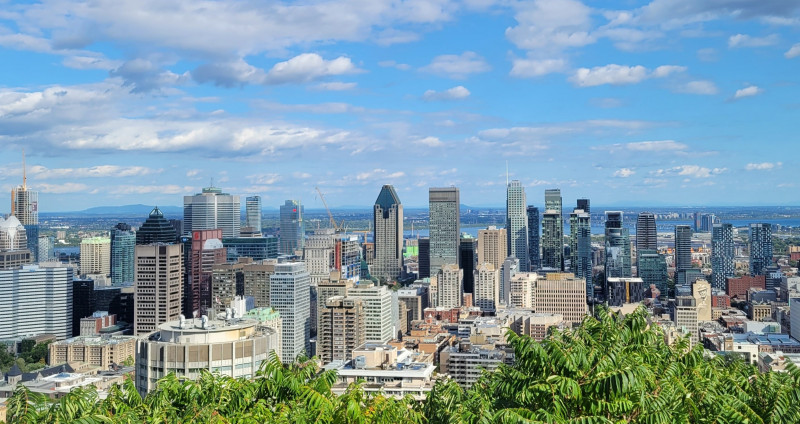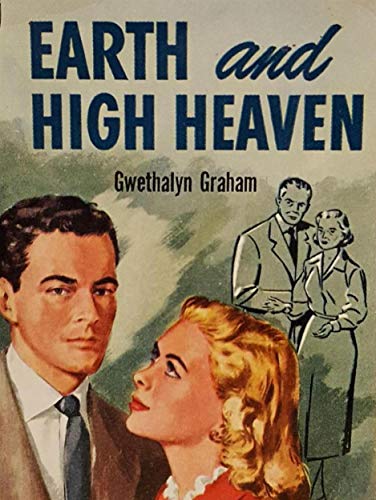Montreal, the largest city in Quebec and second-largest in Canada, was founded in 1642. Originally named Ville-Marie, it is now named after Mount Royal. The city is located on the Island of Montreal and surrounding islands. It's situated 196 km east of Ottawa and 258 km southwest of Quebec City.
1901: Population Increase
By 1901, Montreal's population had risen to 267,000.
1901: First Crematorium in Canada
In 1901, the Mount Royal Cemetery Company established the first crematorium in Canada.
August 1914: Internment Camp Setup
In August 1914, an internment camp was established at Immigration Hall in Montreal.
November 1918: Internment Camp Closure
In November 1918, the internment camp at Immigration Hall in Montreal was closed.
1919: CN formed
In 1919, Montreal-based CN was formed by the Canadian government following a series of country-wide rail bankruptcies.
1924: Illuminated Cross Installation
In 1924, a 31.4 m-high illuminated cross was installed on Mount Royal by the John the Baptist Society.
1944: Publication of Earth and High Heaven
In 1944, Gwethalyn Graham's novel "Earth and High Heaven" was published, depicting the character of Montreal.
1944: Conscription and Houde's Imprisonment
In 1944, the federal government instituted conscription during World War II, while Mayor Camillien Houde, who had been held in a prison camp since protesting conscription, remained imprisoned.
1945: Publication of Bonheur d'occasion
In 1945, Gabrielle Roy's novel "Bonheur d'occasion", also translated as "The Tin Flute", was published, marking a shift in Quebec literature towards urban settings.
1946: Jackie Robinson Breaks Baseball Color Line
In 1946, Jackie Robinson broke the Baseball color line with the Montreal Royals.
1951: Population Surpasses One Million
By 1951, Montreal's population had exceeded one million.
January 15, 1957: Lowest Temperature
On January 15, 1957, the lowest temperature of −37.8 °C (−36 °F) was recorded at Dorval International Airport.
1959: Saint Lawrence Seaway Opens
In 1959, the Saint Lawrence Seaway opened, allowing vessels to bypass Montreal.
1960: Montreal Royals End
In 1960, the minor-league Montreal Royals of the International League ceased operations.
1966: Metro Inauguration
In 1966, the Montreal Metro was inaugurated, featuring 68 stations on four lines.
1967: Expo67
In 1967, Montreal held the World's Fair, also known as Expo67.
1967: International and Universal Exposition
In 1967, Montreal hosted the International and Universal Exposition.
1967: Completion of Saint Joseph's Oratory
In 1967, Saint Joseph's Oratory was completed in Montreal.
1969: Montreal Expos Founded
In 1969, Major League Baseball arrived in Montreal with the founding of the Montreal Expos.
1971: Jewish Community Size
In 1971, the Jewish community in Greater Montreal numbered 109,480 residents.
August 1, 1975: Highest Temperature
On August 1, 1975, the highest temperature of 37.6 °C (99.7 °F) was recorded at Dorval International Airport.
1975: Montreal's homicide rate peaked
In 1975, Montreal's homicide rate peaked at around 10.3 per 100,000 people, with a total of 112 murders.
1976: Summer Olympic Games
In 1976, Montreal hosted the Summer Olympic Games, an event brought to the city by Montreal Mayor Jean Drapeau, who also initiated the Metro project.
1977: Expos Move to Olympic Stadium
In 1977, the Montreal Expos moved into Olympic Stadium.
1978: Super Continental became a Via train
In 1978, CN's flagship train, the Super Continental, which ran daily from Central Station to Vancouver, became a Via train.
1978: Passenger services transferred to Via
In 1978, all of the Canadian Pacific Railway's (CPR) passenger services were transferred to Via Rail.
1981: Visible Minorities in Greater Montreal
Visible minorities accounted for 5.2% of the population in Greater Montreal in 1981.
1982: Annexation of Pointe-aux-Trembles
In 1982, Montreal annexed Pointe-aux-Trembles, marking the last annexation prior to the 2002 mergers.
1989: École Polytechnique Massacre
In 1989, the École Polytechnique massacre occurred in Montreal, where Marc Lépine killed 14 women and wounded 14 others before killing himself.
1990: The Canadian rerouting
In 1990, CN's Super Continental train was eliminated in favor of rerouting The Canadian.
1990: The Canadian terminated in Toronto
Since 1990, The Canadian, the CPR's flagship train, has terminated in Toronto instead of Montreal.
1991: Montreal Machine in World League of American Football
In 1991, The Montreal Machine played in the World League of American Football.
1992: Montreal Machine in World League of American Football
In 1992, The Montreal Machine played in the World League of American Football.
1992: Fibre Optic Light Conversion
In 1992, the cross on Mount Royal was converted to fibre optic light.
1993: Uniprix Stadium Built
In 1993, Uniprix Stadium was built on the site of Jarry Park. It is used for the National Bank Open tennis tournaments.
1993: Montreal Canadiens Stanley Cup victory
In 1993, the Montreal Canadiens won their NHL-record 24th Stanley Cup championship.
November 2, 1995: Ubisoft Montreal Opens
On November 2, 1995, the video game industry began booming in Montreal with the opening of Ubisoft Montreal.
1995: CPR headquarters moved
In 1995, the Canadian Pacific Railway's (CPR) corporate headquarters moved from Windsor Station in Montreal to Calgary, Alberta.
1995: Railway Headquarters
Until 1995, Montreal was the headquarters of the Canadian Pacific Railway.
1996: Canadiens Play at Bell Centre
In 1996, the Montreal Canadiens began playing at the Bell Centre.
1998: Church Attendance
In 1998, weekly church attendance in Quebec was among the lowest in Canada, even though the Greater Montreal Area is predominantly Catholic.
2001: Canada's Most Creative Neighbourhood
A 2001 study deemed the Plateau neighbourhood as Canada's most creative neighbourhood.
January 1, 2002: Montreal Merger
On January 1, 2002, Montreal merged with 27 surrounding municipalities on the Island of Montreal, creating a unified city.
January 2002: Forced Mergers
In January 2002, many boroughs were forcibly merged with Montreal following the 2002 municipal reorganization.
2002: Champ Car World Series
From 2002, the Circuit Gilles Villeneuve also hosted a round of the Champ Car World Series.
2002: Aerospace Jobs
In 2002, Montreal was the fourth-largest center in North America in terms of aerospace jobs.
June 2004: Referendums on Demerger
In June 2004, several former municipalities voted in separate referendums to leave the unified city.
2005: Expos Relocate
In 2005, the Montreal Expos relocated to Washington, D.C., and were rebranded as the Washington Nationals.
2005: International Design Organizations
Since 2005, Montreal has been home to the International Council of Graphic Design Associations (Icograda) and the International Design Alliance (IDA).
January 1, 2006: Demerger Takes Place
On January 1, 2006, the demerger took place, leaving 15 municipalities on the island, including Montreal.
December 2006: Olympic Stadium Paid Off
In December 2006, the debt for the 1976 Olympic Stadium was paid off.
2006: UNESCO City of Design
In 2006, Montreal was designated a UNESCO City of Design, recognizing its design community.
2006: Montreal Metropolitan Community
In 2006, the Montreal Metropolitan Community covered 4,360 km with 3.6 million inhabitants.
2006: Largest European Ethnicities
In the 2006 census, the largest reported European ethnicities in Montreal were French (23%), Italians (10%), Irish (5%), English (4%), Scottish (3%), and Spanish (2%).
2007: High number of homicides
In 2007, Montreal had 42 homicides, the highest number until 2022.
2007: FIFA U-20 World Cup Games
In 2007, Montreal hosted games of the FIFA U-20 World Cup at Olympic Stadium.
2007: Metro expansion to Laval
In 2007, the Montreal Metro was extended to the city of Laval, north of Montreal, with three new stations.
2007: Champ Car World Series
Until 2007, the Circuit Gilles Villeneuve also hosted a round of the Champ Car World Series.
2008: Port of Montreal Cargo
As of 2008, the Port of Montreal handled 26 million tonnes of cargo annually, making it one of the largest inland ports in the world.
2008: Grey Cup Hosted
In 2008, the Olympic Stadium hosted the Grey Cup.
2009: Gentrification of Plateau Mount Royal
As of 2009, the Plateau Mount Royal borough was undergoing significant gentrification.
2009: BIXI Launched
In 2009, BIXI was first launched in Montreal with PBSC Urban Solutions ICONIC bikes as a bicycle-sharing scheme.
2009: Canadian Grand Prix Dropped
In 2009, the Canadian Grand Prix of Formula One (F1) racing was dropped from the Formula One calendar.
2010: Metro daily passengers
As of Q1 2010, the Montreal Metro had a total of 1,050,800 daily passengers on an average weekday.
2010: Shell Closes Refining Centre
In 2010, Shell closed its oil refining centre in Montreal, resulting in job losses and increased dependence on foreign refineries for eastern Canada.
2010: Warner Bros. Opens Studio
In 2010, Warner Bros. Interactive Entertainment announced the opening of its first video game studio in Montreal, which would develop games for Warner Bros. franchises such as Batman and other games from their DC Comics portfolio.
2010: Canadian Grand Prix Returns
In 2010, the Canadian Grand Prix returned to the Formula One calendar.
2010: STM wins award, large number of passengers
In 2010, the Société de transport de Montréal (STM) bus network served 1,347,900 passengers on an average weekday. In the same year, the STM won the award of Outstanding Public Transit System in North America by the APTA, being the first Canadian company to win this prize.
2012: CF Montréal Joins Major League Soccer
In 2012, CF Montréal, formerly known as the Montreal Impact, joined Major League Soccer.
August 2014: Unicycling World Championship
In August 2014, Montreal hosted the 17th unicycling world championship and convention (UNICON).
2014: FIFA U-20 Women's World Cup Games
In 2014, Montreal hosted games of the FIFA U-20 Women's World Cup at Olympic Stadium.
2014: Commuter rail passengers
In 2014, the commuter rail system in Greater Montreal, managed and operated by Exo, carried an average of 79,000 daily passengers.
2015: Increase in sex crimes and fraud
Between 2015 and 2016, sex crimes in Montreal increased by 14.5%, and fraud cases increased by 13%.
2015: FIFA Women's World Cup Games
In 2015, Montreal hosted games in the FIFA Women's World Cup at Olympic Stadium.
April 22, 2016: Réseau express métropolitain unveiled
On April 22, 2016, the forthcoming automated rapid transit system, the Réseau express métropolitain (REM), was unveiled.
2016: Montreal Population in 2016
In 2016, Montreal had a population of 1,704,694.
2016: Minimum in murders, increase in sex crimes and fraud
In 2016, Montreal's murder rate reached a minimum with 23 murders. However, sex crimes increased by 14.5% between 2015 and 2016, and fraud cases increased by 13% over the same period.
2017: Livability Ranking
In 2017, Montreal was ranked as the 12th-most livable city in the world by the Economist Intelligence Unit.
March 2018: Global Financial Centres Index Ranking
As of March 2018, Montreal was ranked 12th in the Global Financial Centres Index, which assesses the competitiveness of financial centers worldwide.
April 12, 2018: REM groundbreaking
On April 12, 2018, groundbreaking occurred for the Réseau express métropolitain (REM) project.
2018: La Presse Goes Online Daily
In 2018, La Presse, a French-language daily newspaper, became an online daily.
2018: Global City Ranking
In 2018, Montreal was ranked as a global city.
2018: Trudeau Airport traffic
In 2018, Pierre Elliott Trudeau International Airport was the third busiest airport in Canada by passenger traffic and aircraft movements, handling 19.42 million passengers and 240,159 aircraft movements.
2019: Homicides reported
In 2019, 25 homicides were reported in Montreal.
2019: Montreal's Economy
In 2019, the Metropolitan Montreal area accounted for CA$234.0 billion of Quebec's CA$425.3 billion GDP, solidifying its position as an important center for various sectors.
2019: Metro train modernization
Starting in 2019, the Montreal Metro began modernizing its trains, introducing new Azur models with inter-connected wagons.
2020: Increase in homicides
In 2020, Montreal saw an increase in overall crime, with a notable increase in homicides. 25 homicides were reported in 2020 which matched the number reported in 2019.
2020: Canadian Grand Prix Dropped Again
In 2020, the Canadian Grand Prix was dropped from the calendar again due to the COVID-19 pandemic.
2021: Panethnic Breakdown
According to the 2021 census, the panethnic breakdown of Montreal's population was: European (60.3%), African (11.5%), Middle Eastern (9.3%), South Asian (4.6%), Latin American (4.5%), Southeast Asian (3.8%), East Asian (3.8%), Indigenous (0.9%), and Other/Multiracial (1.3%).
2021: Christian Population
In 2021, 49.5% of Montreal's total population identified as Christian. Roman Catholics, primarily descendants of French settlers and people of Italian and Irish origin, made up 35.0% of the population. Protestants comprised 11.3%, while Orthodox Christians consisted of 3.2% of the population.
2021: Religious Demographics
In 2021, Islam was the largest non-Christian religious group in Montreal, with 218,395 members, representing 12.7% of the population. The Jewish community numbered 90,780.
2021: Increase in murders and shootings
In 2021, Montreal experienced a 48% increase in murders, totaling 37, resulting in a homicide rate of around 2.1 per 100,000 people. The Montreal Police Annual Report for 2021 showed 144 shootings across the city, averaging one every 2.5 days.
2021: Livability Ranking Slip
In 2021, Montreal's ranking as a livable city slipped to 40th due to healthcare stress from the COVID-19 pandemic.
2021: Language Spoken
In 2021, according to the Census, 47.0% of Montreal residents primarily spoke French, while 13.0% spoke English. Additionally, 2% spoke both English and French. A significant portion, 32.8%, spoke a non-official language as their first language, with Arabic, Spanish, and Italian being the most common.
2021: Canadian Grand Prix Dropped Again
In 2021, the Canadian Grand Prix was dropped from the calendar again due to the COVID-19 pandemic.
2021: Montreal Population (2021 Census)
In 2021, the Canadian census reported Montreal's population at 1,762,949, with a metropolitan population of 4,291,732, ranking it as Canada's second-largest metropolitan area. The census also indicated that 85.7% of the city's population considered themselves fluent in French, while 58.5% were bilingual in French and English.
2021: Visible Minorities
In the 2021 census, visible minorities comprised 38.8% of Montreal's population.
2021: Children and Elderly Population
The 2021 census recorded 270,430 (15.3%) children between 0 and 14 years of age and 295,475 (16.8%) people aged 65 and over in Montreal.
2022: REM opening phase
As of 2022, the Réseau express métropolitain (REM) was scheduled to open in three phases.
2022: Increase in homicides
In 2022, Montreal saw another 10.8% increase in homicides, with a total of 41 being reported, resulting in a homicide rate of 2.3 per 100,000 people. It was the highest number since 2007.
2023: Alouettes Win Grey Cup
In 2023, the Montreal Alouettes won the Grey Cup.
2024: Elie-Wiesel Park Inauguration
In 2024, Elie-Wiesel Park was inaugurated in honour of Elie Wiesel, featuring a playground, relaxation area, walking trails, furniture, green spaces, and unique water features.
2027: REM completion
The Réseau express métropolitain (REM) is scheduled to be fully completed by 2027.
2030: Projected Population
According to Statistics Canada, by 2030, the Greater Montreal Area is expected to number 5,275,000 with 1,722,000 being visible minorities.
Mentioned in this timeline
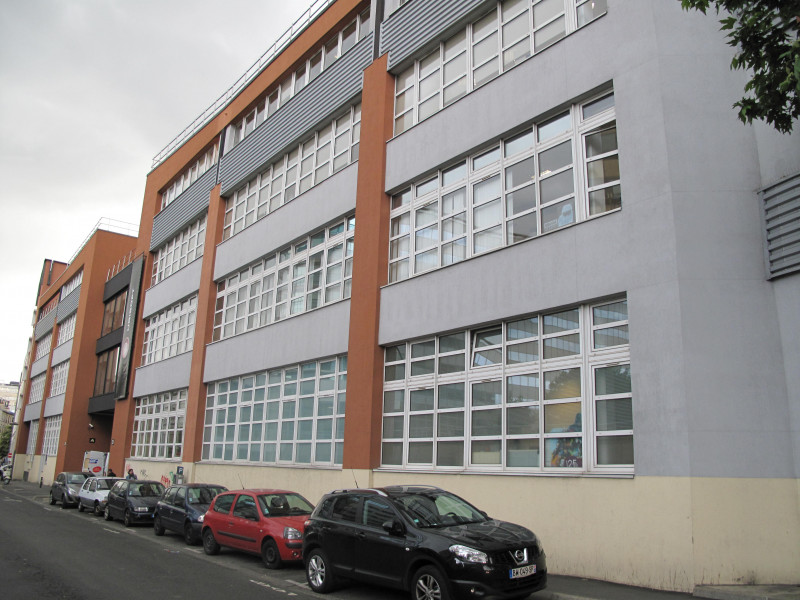
Ubisoft Entertainment SA is a French video game publisher with...
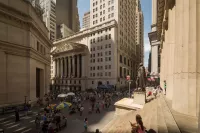
The stock market is where buyers and sellers trade stocks...
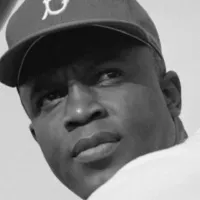
Jackie Robinson was a pivotal figure in American history As...

Washington D C is the capital city and federal district...
World War II - was a global conflict between the...

Football is a family of team sports primarily involving kicking...
Trending

11 minutes ago Cleetus McFarland to debut in NASCAR Truck Series; Pastrana returns to Daytona.
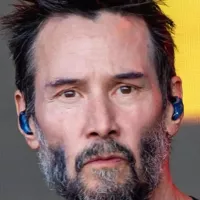
11 minutes ago Keanu Reeves' John Wick game announced for PlayStation 5, developed by Saber Interactive.

11 minutes ago Anthony Anderson discusses health, diabetes, and career on 'Uncensored' and reveals his net worth.

11 minutes ago Amon-Ra St. Brown: Ranking Football Talent, Lions News, and Basketball Background

12 minutes ago Jeremy Lin's Post-Linsanity Journey: From NBA to Celebrity Game and 2026 All-Star

12 minutes ago Tony Stewart returns to NASCAR Truck Series with Ram at Daytona, supported by Dana White.
Popular

Kid Rock born Robert James Ritchie is an American musician...
The Winter Olympic Games a major international multi-sport event held...

Barack Obama the th U S President - was the...

Pam Bondi is an American attorney lobbyist and politician currently...

XXXTentacion born Jahseh Dwayne Ricardo Onfroy was a controversial yet...

Michael Joseph Jackson the King of Pop was a highly...
